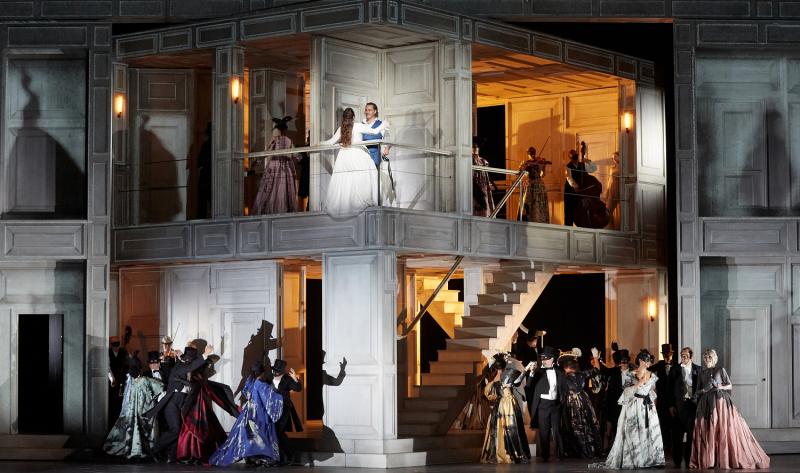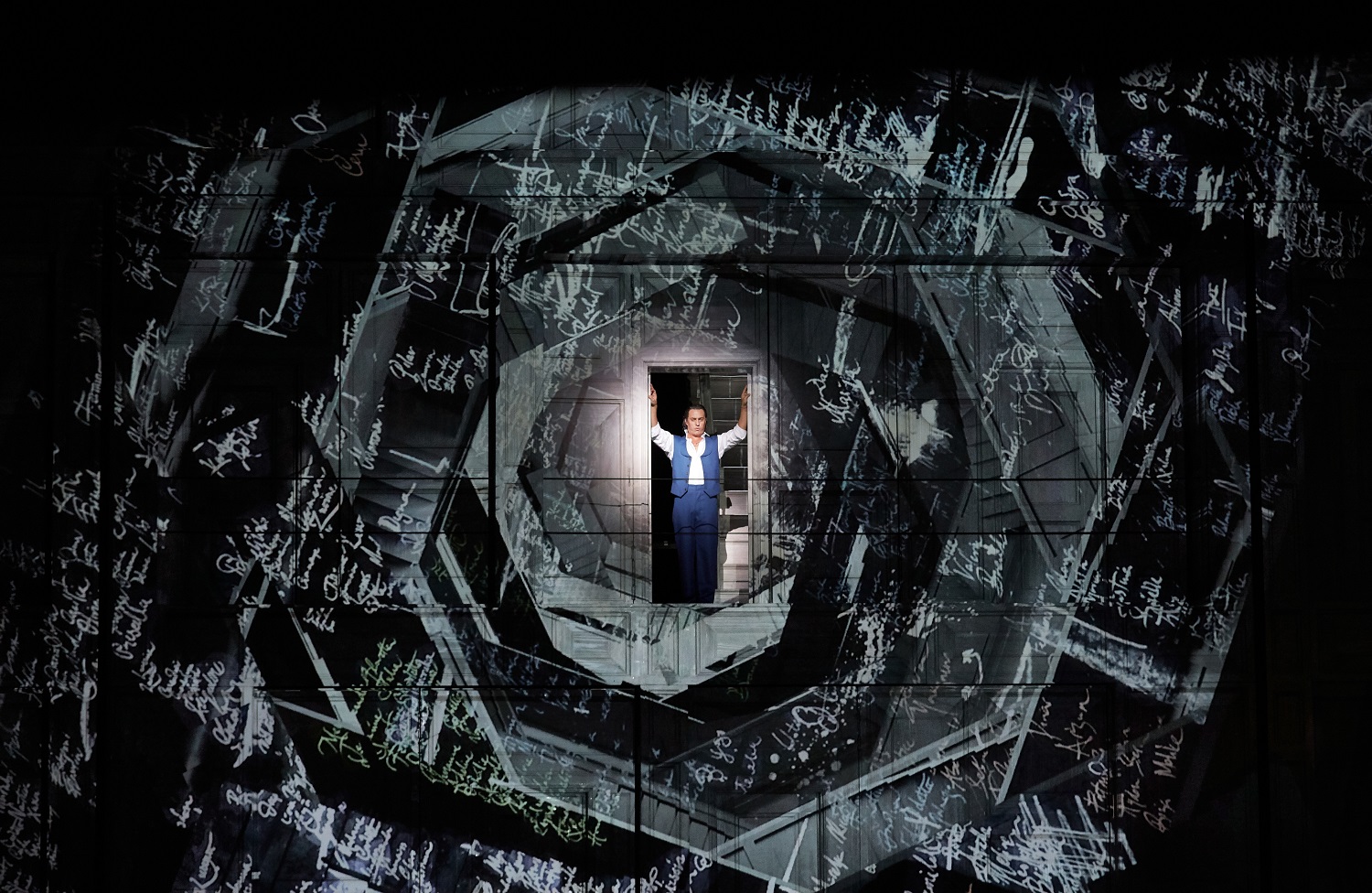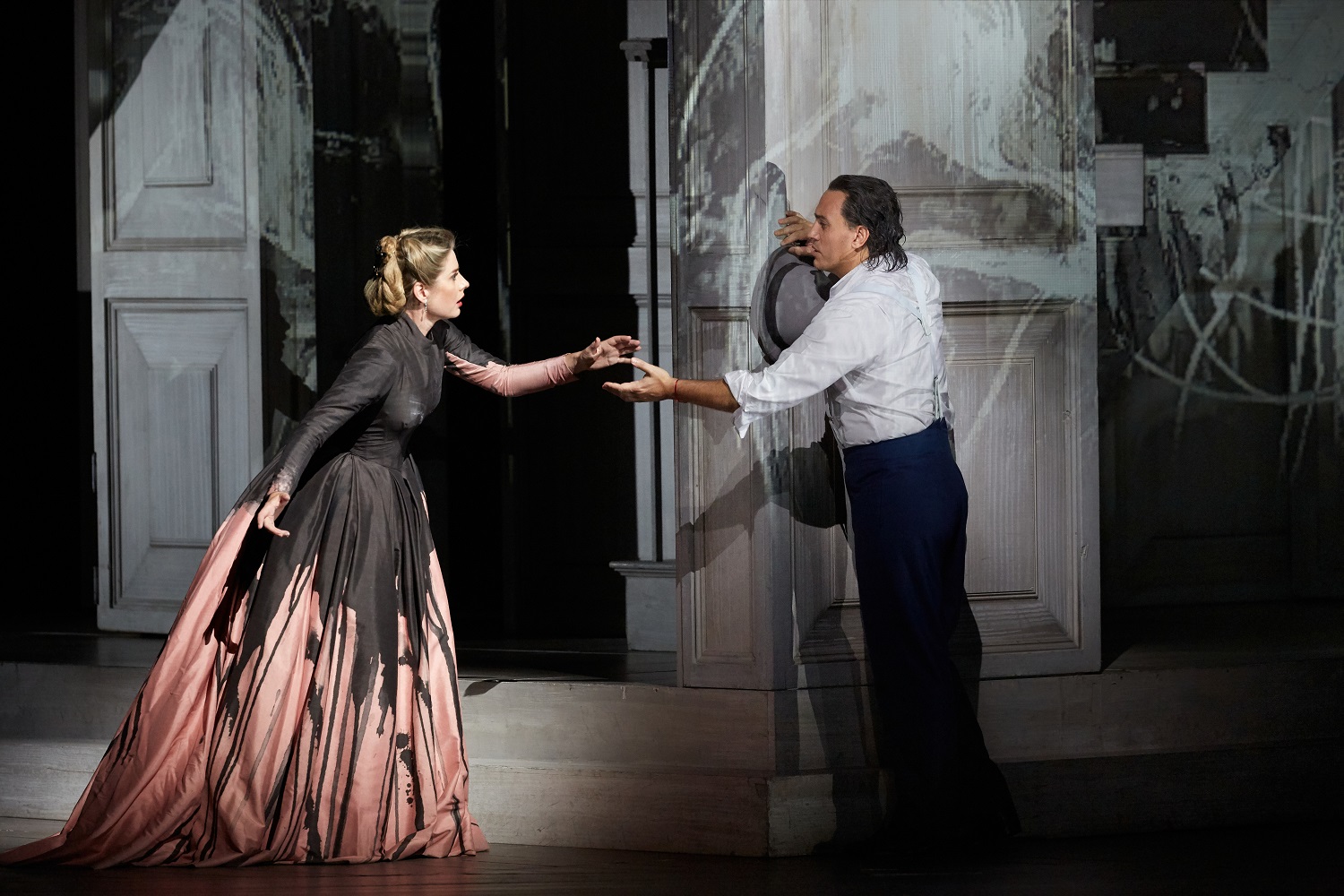Don Giovanni, Royal Opera review - laid-back Lothario | reviews, news & interviews
Don Giovanni, Royal Opera review - laid-back Lothario
Don Giovanni, Royal Opera review - laid-back Lothario
Revival cast variable, but Erwin Schrott delivers as the would-be seducer

Kasper Holten left a mixed bag of productions behind at Royal Opera when he left in 2017, but the best of them - though not all my colleagues on The Arts Desk have agreed - is this Don Giovanni, now back for its latest revival.
Visually, the production is stunning. The set (designer Es Devlin) is a full-sized house, onto which videos are projected (video designer Luke Halls). The house rotates, and the projections follow, a high-tech effect that manages to keep the eye tricked for the entire length of the opera. The two storeys of the house create a double-tier set. The action typically takes place below, while ghostly apparitions of the Don’s previous conquests float around in the floor above. As does the Commendatore (Brindley Sherrratt), who is an almost continuous presence. The set fills in well for almost every scene setting – only the graveyard requires a leap of imagination. Revival director Jack Furness has only made a few changes to the action. Most significantly, Mozart’s silly moralising Epilogue has been put back in. When it was omitted, in previous revivals, the dramatic conclusion had much more power, especially as visualised by Holten and his team. One consequence of the high-tech approach is that interactions between the characters can sometimes seem to be replaced with the light show, but the cast for this new revival makes a strong case for all their bonds and enmities.
Revival director Jack Furness has only made a few changes to the action. Most significantly, Mozart’s silly moralising Epilogue has been put back in. When it was omitted, in previous revivals, the dramatic conclusion had much more power, especially as visualised by Holten and his team. One consequence of the high-tech approach is that interactions between the characters can sometimes seem to be replaced with the light show, but the cast for this new revival makes a strong case for all their bonds and enmities.
Erwin Schrott (pictured above) is impressive as the Don. He takes a relaxed approach, suave and ingratiating, and only rarely creepy or lecherous. That sets the tone for the entire performance, which becomes more expansive, with the drama unfolding through the music, rather than the impulsive actions of the title character. Vocally, Schrott is ideal, his tone broad and unforced, with plenty of character and variety. His recitatives are particularly impressive, often with an intimate spoken quality, but always beautifully projected.  The rest of the cast is serviceable, with only a few standout voices. Roberto Tagliavini has a good voice for Leporello and a suitably dishevelled stage presence. There is little slapstick in this production, so no acrobatics for him, but Tagliavini still convinces. Among the ladies, Malin Byström (pictured below, with Erwin Schrott) stands out as Donna Anna. She has a classic Mozart voice, crystal clear, with an elegant tone and excellent diction – luxury casting, here or anywhere. Myrtò Papatanasiu (a last-minute stand in) was less convincing as Donna Elvira, her tone shrill and her upper register insecure. Leon Košavić is a bit wet as Masetto, his voice bland and underpowered. But he blends well with Louise Alder, who is suitably pure of tone for the role of Zerlina. Brindley Sherratt is hollow-sounding as the Commendetore, but he is a suitably imposing presence in the final scene.
The rest of the cast is serviceable, with only a few standout voices. Roberto Tagliavini has a good voice for Leporello and a suitably dishevelled stage presence. There is little slapstick in this production, so no acrobatics for him, but Tagliavini still convinces. Among the ladies, Malin Byström (pictured below, with Erwin Schrott) stands out as Donna Anna. She has a classic Mozart voice, crystal clear, with an elegant tone and excellent diction – luxury casting, here or anywhere. Myrtò Papatanasiu (a last-minute stand in) was less convincing as Donna Elvira, her tone shrill and her upper register insecure. Leon Košavić is a bit wet as Masetto, his voice bland and underpowered. But he blends well with Louise Alder, who is suitably pure of tone for the role of Zerlina. Brindley Sherratt is hollow-sounding as the Commendetore, but he is a suitably imposing presence in the final scene.
The orchestra seemed under-rehearsed, with some ensemble problems in the strings and a lot of splits from the horns. Conductor Hartmut Haenchen gave a broad, Romantic reading of the score, with enough drama to keep the story rolling, but little sense of urgency. That approach chimed with Erwin Schrott’s relaxed reading of the title role – charming and elegant, and only occasionally revealing the dark forces beneath.
rating
Explore topics
Share this article
Add comment
The future of Arts Journalism
You can stop theartsdesk.com closing!
We urgently need financing to survive. Our fundraising drive has thus far raised £49,000 but we need to reach £100,000 or we will be forced to close. Please contribute here: https://gofund.me/c3f6033d
And if you can forward this information to anyone who might assist, we’d be grateful.

Subscribe to theartsdesk.com
Thank you for continuing to read our work on theartsdesk.com. For unlimited access to every article in its entirety, including our archive of more than 15,000 pieces, we're asking for £5 per month or £40 per year. We feel it's a very good deal, and hope you do too.
To take a subscription now simply click here.
And if you're looking for that extra gift for a friend or family member, why not treat them to a theartsdesk.com gift subscription?
more Opera
 The Railway Children, Glyndebourne review - right train, wrong station
Talent-loaded Mark-Anthony Turnage opera excursion heads down a mistaken track
The Railway Children, Glyndebourne review - right train, wrong station
Talent-loaded Mark-Anthony Turnage opera excursion heads down a mistaken track
 La bohème, Opera North review - still young at 32
Love and separation, ecstasy and heartbreak, in masterfully updated Puccini
La bohème, Opera North review - still young at 32
Love and separation, ecstasy and heartbreak, in masterfully updated Puccini
 Albert Herring, English National Opera review - a great comedy with depths fully realised
Britten’s delight was never made for the Coliseum, but it works on its first outing there
Albert Herring, English National Opera review - a great comedy with depths fully realised
Britten’s delight was never made for the Coliseum, but it works on its first outing there
 Carmen, English National Opera review - not quite dangerous
Hopes for Niamh O’Sullivan only partly fulfilled, though much good singing throughout
Carmen, English National Opera review - not quite dangerous
Hopes for Niamh O’Sullivan only partly fulfilled, though much good singing throughout
 Giustino, Linbury Theatre review - a stylish account of a slight opera
Gods, mortals and monsters do battle in Handel's charming drama
Giustino, Linbury Theatre review - a stylish account of a slight opera
Gods, mortals and monsters do battle in Handel's charming drama
 Susanna, Opera North review - hybrid staging of a Handel oratorio
Dance and signing complement outstanding singing in a story of virtue rewarded
Susanna, Opera North review - hybrid staging of a Handel oratorio
Dance and signing complement outstanding singing in a story of virtue rewarded
 Ariodante, Opéra Garnier, Paris review - a blast of Baroque beauty
A near-perfect night at the opera
Ariodante, Opéra Garnier, Paris review - a blast of Baroque beauty
A near-perfect night at the opera
 Cinderella/La Cenerentola, English National Opera review - the truth behind the tinsel
Appealing performances cut through hyperactive stagecraft
Cinderella/La Cenerentola, English National Opera review - the truth behind the tinsel
Appealing performances cut through hyperactive stagecraft
 Tosca, Royal Opera review - Ailyn Pérez steps in as the most vivid of divas
Jakub Hrůša’s multicoloured Puccini last night found a soprano to match
Tosca, Royal Opera review - Ailyn Pérez steps in as the most vivid of divas
Jakub Hrůša’s multicoloured Puccini last night found a soprano to match
 Tosca, Welsh National Opera review - a great company reduced to brilliance
The old warhorse made special by the basics
Tosca, Welsh National Opera review - a great company reduced to brilliance
The old warhorse made special by the basics
 BBC Proms: The Marriage of Figaro, Glyndebourne Festival review - merriment and menace
Strong Proms transfer for a robust and affecting show
BBC Proms: The Marriage of Figaro, Glyndebourne Festival review - merriment and menace
Strong Proms transfer for a robust and affecting show
 BBC Proms: Suor Angelica, LSO, Pappano review - earthly passion, heavenly grief
A Sister to remember blesses Puccini's convent tragedy
BBC Proms: Suor Angelica, LSO, Pappano review - earthly passion, heavenly grief
A Sister to remember blesses Puccini's convent tragedy

Comments
Can't agree either with the
The review is incorrect about
I'm curious about the fate of
I'm curious about the fate of the Epilogue. When I saw Holten's infuriating production first time round, there was, as you say, only a cut version, sung behind the drop-curtain. I understood that second time around, even that had gone. Would be interested in the history of this debacle. My own feeling is that it's all great music and should all be there. Deborah Warner's Glyndebourne production made it work superbly - I remember teaching students who were all agin Life after the Descen to Hell until I showed them that, and it changed their minds.
Now that you mention it, the
I agree with those who have
The take on Donna Anna - that
The take on Donna Anna - that she was lying and actually had sex with Don Giovanni before her father discovered them - is such a cliche now, especially among male directors. What I found so refreshing about Deborah Warner's take at Glyndebourne was that she took Donna Anna's youth and vulnerability at face value, making it clear that when a woman says no, she means no. There is no evidence in Mozart, Da Ponte or Tirso that she 'really wanted it', even if she does seem obsessed. To ward off rape and have the would-be rapist kill your father in quick succession is enough to make anyone unstable.
Nobody seems to mention how